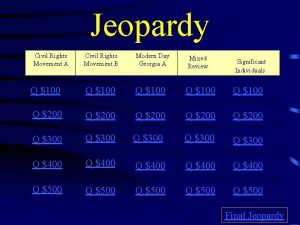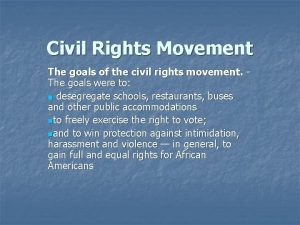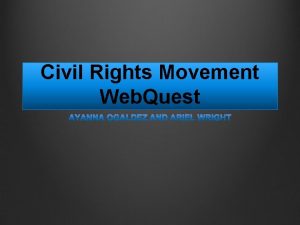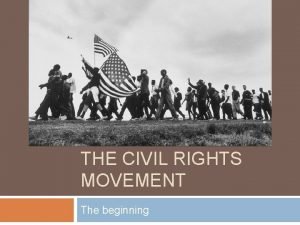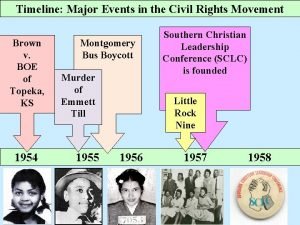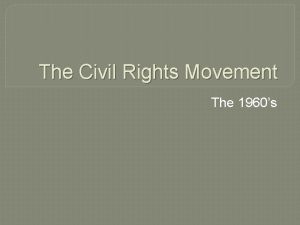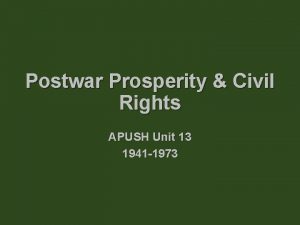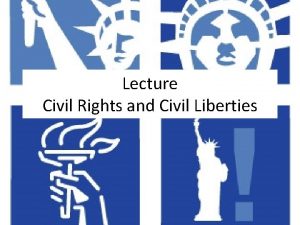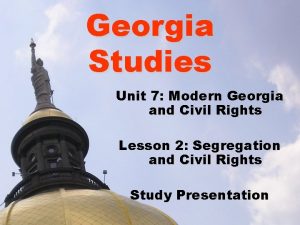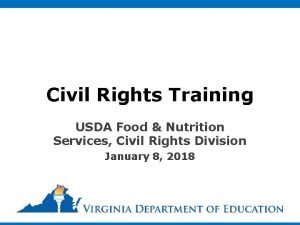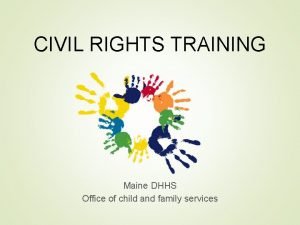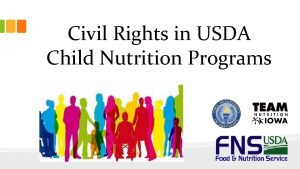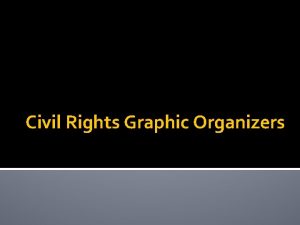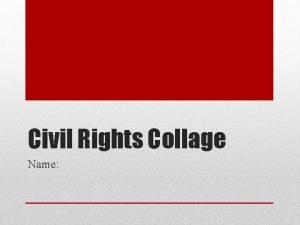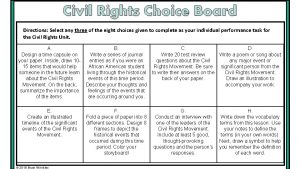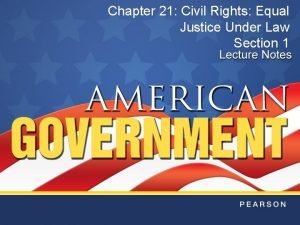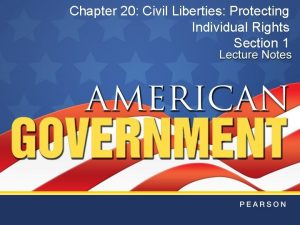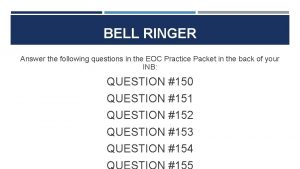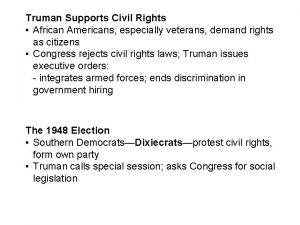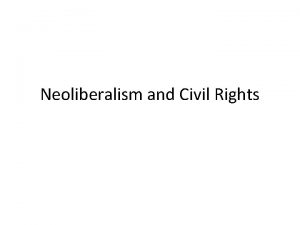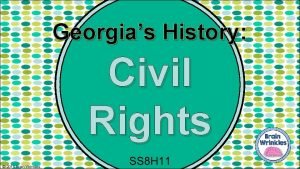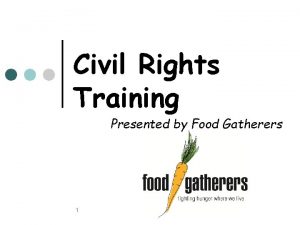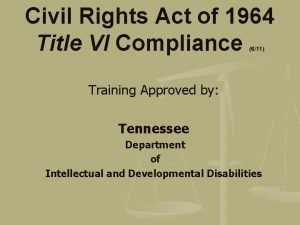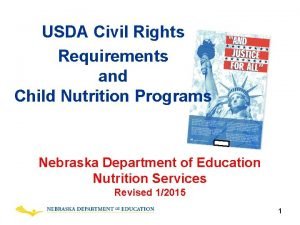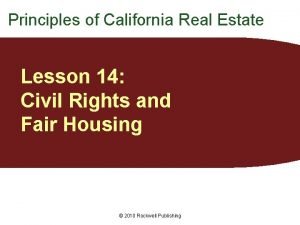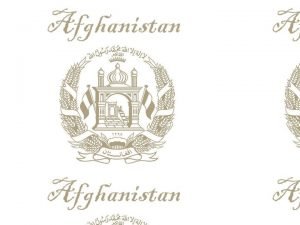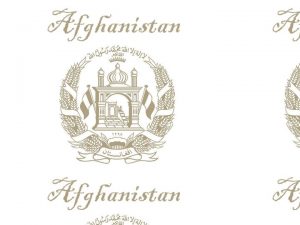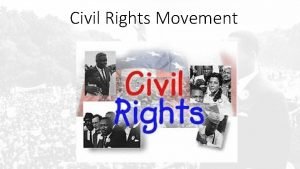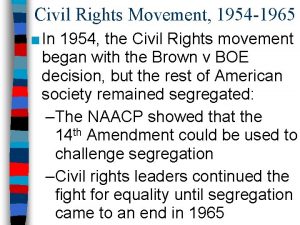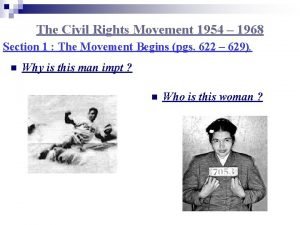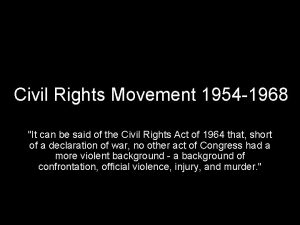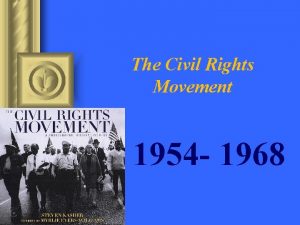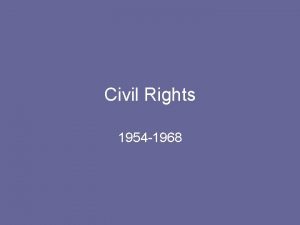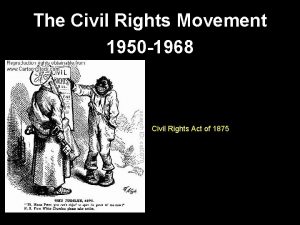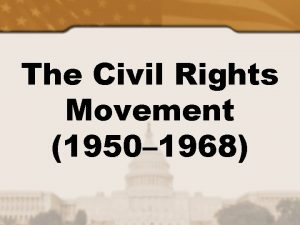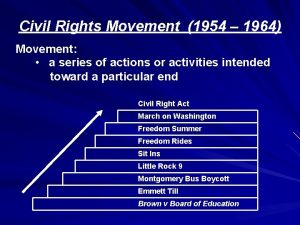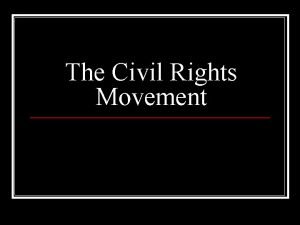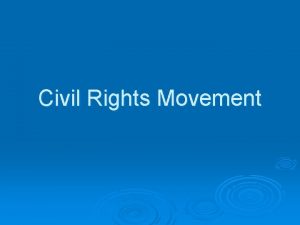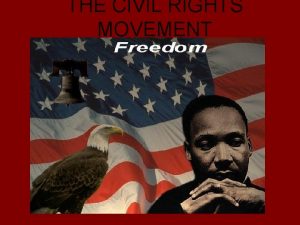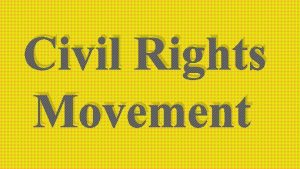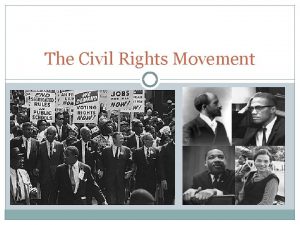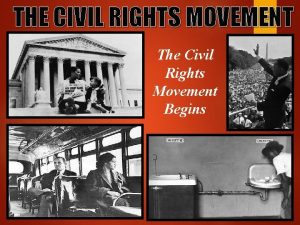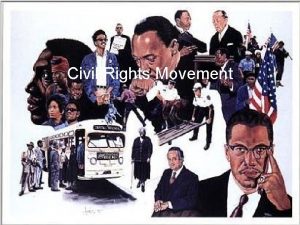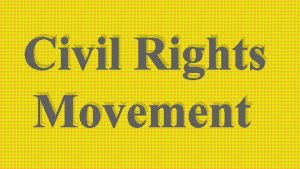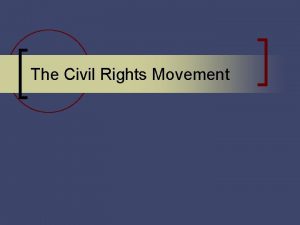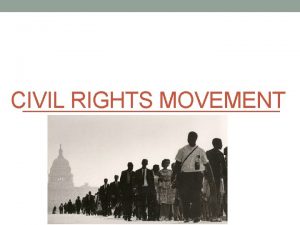Civil Rights Movement 1954 1968 Mr Condrys Social





























- Slides: 29

Civil Rights Movement 1954 - 1968 Mr. Condry’s Social Studies Class

Reconstruction Amendments • 13 th Amendment – Outlawed slavery • 14 th Amendment – Made African Americans citizens – Guaranteed equal protection under the law • 15 th Amendment – Guaranteed African Americans the right to vote

Plessy v. Ferguson (1896) • U. S. Supreme Court case that made segregation legal in the United States. • “Separate but Equal”

Early Civil Rights Leaders • W. E. B. Du. Bois – pushed for immediate civil rights and equality. – Leader of NAACP • Booker T. Washington – Founder of the Tuskegee Institute.

NAACP (1909) • National Association for the Advancement of Colored People was established. • Worked to end segregation

Integration of Baseball • Jackie Robinson was born in Cairo, Georgia in 1919 • 1944, Robinson played in the Negro leagues on a team called the Kansas City Monarchs. • 1946 Brooklyn Dodgers sign Jackie • Jackie Robinson, at the age of 27, became the first African American baseball player in the major league history.

Integration of the Military (1948) • President Truman integrates the military in 1948

Brown v. Board of Education (1954) • Supreme Court rules “separate educational facilities are inherently unequal. ” • Violated the 14 th Amendment • Ends school segregation

Montgomery Bus Boycott (1955) • Rosa parks arrested for refusing to move to the back of the bus. • A boycott follows, leading to desegregation.

Emmitt Till (1955) • 14 year old boy from Chicago whose murder in 1955 made national news. • He was lynched and murdered after he said “bye baby” to a white woman who was a cashier at a store in Money, Mississippi.

Integration of Schools (1957) • Little Rock, Arkansas • “The Little Rock Nine” • President Eisenhower sends federal troops after Arkansas governor Orval Faubus uses the National Guard to deny entrance to African American Students at Central High School

Greensboro Sit-ins (1960) • College students in Greensboro, NC stage a sitin at the Woolworth’s lunch counter • Passive form of protests

Ruby Bridges (1960) • Became the first African American elementary school child to attend a white school. • Had to be escorted to school by federal marshals • Many teachers refused to teach her and many of the white students went home. • She went to school everyday.

Freedom Rides (1961) • Protests the segregation of interstates and busses. • Volunteers (all races), took buses into the South to test new desegregation laws, often meet with violence.


University of Mississippi (1962) • James Meredith, the school’s first African American student • President Kennedy sends 5000 federal troops to Mississippi

Birmingham, Alabama (1963) • Martin Luther King and the Southern Christian Leadership Conference (SCLC) focus on segregation in Birmingham. • Protests end in violence, riots, and arrests of adults and children.

March on Washington (1963) • To protest job discrimination and freedom for all. • 200, 000 people hear Martin Luther King’s “I have a Dream” speech in Washington, D. C.

Bombing in Birmingham (1963) • 16 th St. Baptist Church, a bomb explodes on a Sunday morning, killing four young girls. • KKK member seen planting bomb was arrested and found guilty of possessing dynamite without a permit. • Fined $100 and serves six months in jail.

24 th Amendment (1964) • Outlawed poll taxes. • African American voter registration begins to increase.

Civil Rights Act 1964 • Outlaws discrimination based on race.

Mississippi Freedom Summer (1964) • Civil rights activists attempt to register African Americans to vote

Selma March (1965) • Demanding voting rights, 600 protesters plan to march to Montgomery. • 6 blocks into the march, they meet state troopers armed with nightsticks and tear gas.

Voting Rights Act (1965) • In the aftermath of Selma, President Johnson calls for passage of a voting rights bill. • Outlaws literacy tests, established federal oversight

Protests – Different views • Martin Luther King, Jr. : – Non-violent, passive resistance – Influenced by Gandhi • Black Power: – Proactive, militant, focus on black pride and African heritage. – Term popularized by Stokely Carmichae. L

Malcolm X • Born Malcolm Little, he learned the ideas of black pride and self-reliance from his father, a follower of Marcus Garvey and member of the UNIA • While in Prison, he converted to Islam and joined the Nation of Islam. • Upon release, he changed his name; the X represented the African heritage he would never know. • He preached the superiority of blacks and separation from whites; he scorned King’s non-violence saying black people should use any means to protect themselves. • Between 1952 and 1963, the Nation of Islam grew from 500 members to 25, 000.

Malcom X • In 1964, Malcolm X made a pilgrimage to Mecca. • After seeing Muslims of different races treating each other as equals, he changed his views. • After a meeting in February 1965, Malcolm X was assassinated by two members of the Nation of Islam. • The men were caught and imprisoned for their crime, but they proclaimed their innocence. • Became the most well known African American radical

Urban Race Riots (1965 -1967) • A call for economic rights – Watts, California – Detroit, Michigan – Newark, New Jersey

Martin Luther King, Jr. Assassinated (1968) • King was shot by James Earl Ray in Memphis, Tennessee
 Civil rights and civil liberties webquest
Civil rights and civil liberties webquest Rosa parks mother
Rosa parks mother Civil rights movement jeopardy
Civil rights movement jeopardy Civil rights movement goal
Civil rights movement goal Civil rights movement vocabulary
Civil rights movement vocabulary Civil rights movement webquest
Civil rights movement webquest The civil rights movement
The civil rights movement Civil rights movement essential questions
Civil rights movement essential questions Civil rights timeline of events
Civil rights timeline of events Civil rights sitins
Civil rights sitins Montgomery bus boycott apush
Montgomery bus boycott apush Right to die
Right to die Unit 7: modern ga and civil rights
Unit 7: modern ga and civil rights Usda civil rights training
Usda civil rights training Civil rights training certificate
Civil rights training certificate Civil rights in child nutrition programs
Civil rights in child nutrition programs Civil rights graphic organizer
Civil rights graphic organizer Civil rights collage
Civil rights collage Civil rights choice board
Civil rights choice board Chapter 21 civil rights equal justice under law
Chapter 21 civil rights equal justice under law Chapter 20 civil liberties protecting individual rights
Chapter 20 civil liberties protecting individual rights Civil rights bell ringers
Civil rights bell ringers Truman supports civil rights
Truman supports civil rights Characteristics of civil rights
Characteristics of civil rights Civil rights cloze notes 1
Civil rights cloze notes 1 Brain wrinkles social studies answer key
Brain wrinkles social studies answer key Civil rights training quiz answers
Civil rights training quiz answers Title vi of the civil rights act of 1964
Title vi of the civil rights act of 1964 Civil rights in child nutrition programs
Civil rights in child nutrition programs Unruh civil rights act real estate
Unruh civil rights act real estate


